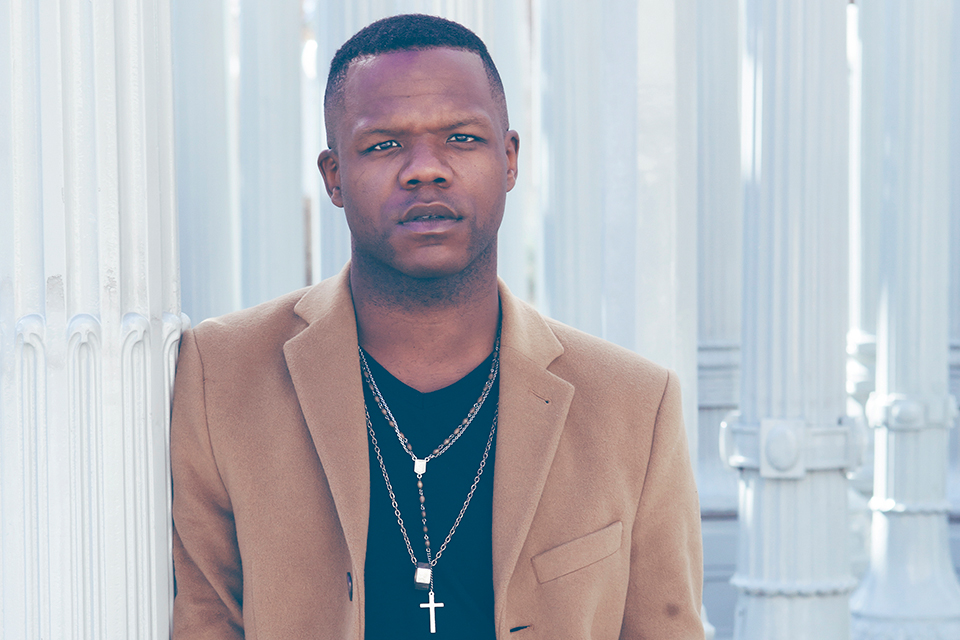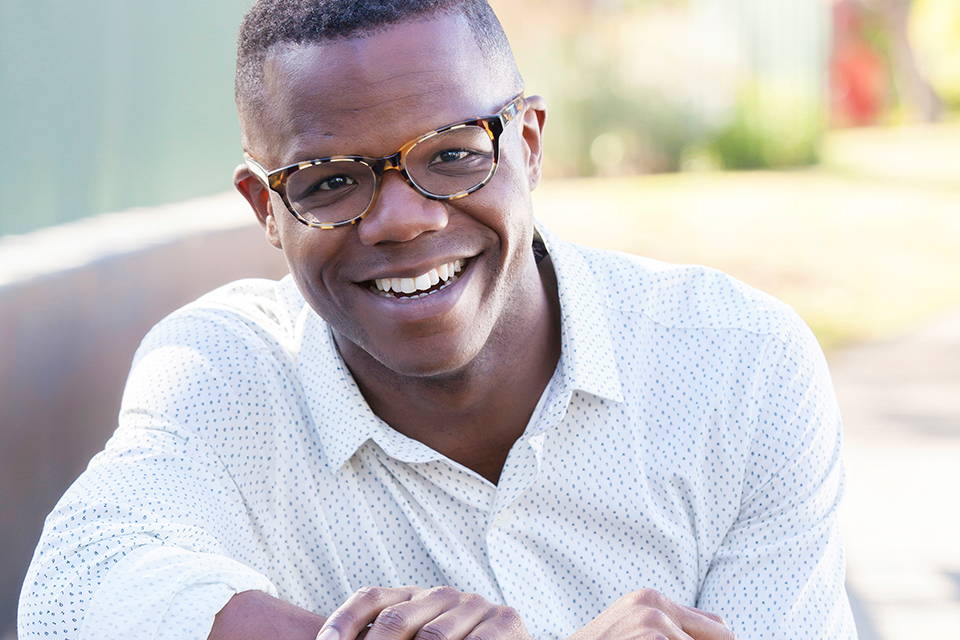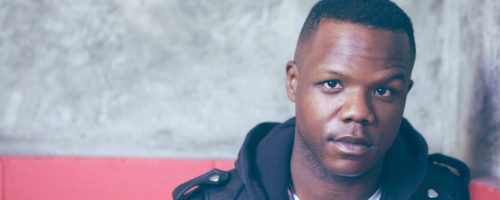For actor Tory Devon Smith being in the entertainment industry isn’t about fame.
“Red carpet is not the goal, the goal is not awards . . . it’s about brilliant work and working with writers and directors who teach me about life,” says the dynamic, outspoken and bright California native whose breakout roles include Valenté, assistant to Zoe (played by Brandy) on BET’s Zoe Ever After and Little Wolf on the Netflix series The Get Down.
Smith, who says he combines his own style and “bombasticness” when playing Valenté, knew acting was right for him at age 16 when he attended a theatre camp at the California State Summer School for the Arts, a very intense program for young artists.
“That’s where I really felt a connection to the profession of acting,” he explains. “Beforehand, I just felt like this was something I did, like I was just a performer.” Late ’60s and early ’70s films inspired Smith to grow from performing to acting in the early years of his career. “It’s where I really connected the dots. I’d watch really, really great films that I’d never seen before like The Graduate (1967) and Harold and Maude (1971).”
As an openly gay actor in Hollywood, Smith says more shows like HBO’s Looking with its accurate and true-to-life storytelling are needed. The show highlights how a group of gay friends deals with life while looking for love in San Francisco. “To me it was a real, honest and almost raw depiction of how gay men live, and we need more of this in the media.”

“I always find that when you are depicting a scene in which a character is coming out you have to handle it with great care and great seriousness.”
VALENTÉ IS A VERY FUN AND MORE BUBBLY KIND OF CHARACTER. WHAT ARE THE SIMILARITIES AND DIFFERENCES BETWEEN VALENTÉ AND YOURSELF?
It was interesting, I never thought that I would get my breakthrough in television with a character that was so close to me. He’s actually rather close to me in terms of our humour and style of dress. He’s a little bit more courageous because he says what he thinks right off the bat. I like to think a little bit . . . I love in life to make it light, bright and gay and Valenté is the same way. He has no filter, but I don’t think he’s inappropriate, I think he’s himself . . . I’m actually more introverted than some people expect of me . . . I love my alone time.
ON ZOE EVER AFTER, YOU HAD A VERY POWERFUL COMING OUT SCENE TO YOUR CHARACTER VALENTÉ’S PARENTS AT A FAKE WEDDING WITH ANOTHER CHARACTER. AS A GAY MAN YOURSELF WHAT WAS IT LIKE RECORDING THAT SCENE?
It was really interesting. I always find that when you are depicting a scene in which a character is coming out you have to handle it with great care and great seriousness. It was important for me to express it truthfully, because in my real life I never had to come out. It was just sort of coming to a realization. I didn’t have to tell people and that’s mainly because I grew up as a foster kid, so there was no real connection to a person that I lived with for a long amount of time for that to be revealed. In some homes it wasn’t necessarily talked about or I never really knew what that was . . . It doesn’t matter what your gender or sexuality is, we all have to come to a realization of who we are, also what we like and how we become sexually comfortable in the world. It was really important for me to have that truth come across and Brandy was just so supportive. [During the scene] she was on the side just crying and crying . . . [she said], ‘what you do is just beautiful.’ It was really wonderful to see her affection for me in that moment.
ONCE YOU DID HAVE THAT COMING TO REALIZATION MOMENT HOW DID THAT ALLOW YOU TO FEEL A SENSE OF FREEDOM WITHIN THE WORLD AND IN THE LGBTQ+ COMMUNITY?
For me, I think coming to the realization or coming out is really, really important to get to the truth of yourself and how you can live in the world . . . As an actor, I was much more truthful after coming to this realization. It was vital that that happened to me, it’s vital for everyone and it’s important now that we have examples of gay characters in the media or gay [actors] who are out and strong and successful. In [America], I feel like sex has been a taboo and with sex comes sexuality so it’s been this incredibly detrimental and dangerous taboo where everything is sort of not said and things need to be loud so people across this nation know that it’s OK. It’s important to tell our young folks growing up, that it’s necessary to be yourself. When I came out, it was everything and I was completely comfortable with myself from then on out.
HOW DOES YOUR CHARACTER AS VALENTÉ DIFFER FROM YOUR ROLE AS LITTLE WOLF IN THE NEW NETFLIX SERIES THE GET DOWN?
Little Wolf is pretty extreme. He does drugs and he’s in a very, very dangerous climate, while Valenté was not. Valenté was in the now while Little Wolf is from the ’70s, which is an entirely different time. Valenté I doubt could prosper in Little Wolf’s world and Little Wolf wouldn’t prosper now in Valenté’s world because we don’t celebrate that sort of lifestyle. It was interesting just as an actor to go from one to the other and be able to be versatile in my first two roles. I was extremely grateful for that opportunity.

“The dream is not to win an Oscar, that’s not the dream, that’s a fantasy.’ The dream is that I get to afford my life as an actor, that’s what I’m still striving for.”
NAS IS ONE OF THE SERIES’ EXECUTIVE PRODUCERS AND THE SHOW IS FOCUSED ON THE BEGINNINGS OF HIP-HOP. WHAT IS YOUR EARLIEST MEMORY OF HIP-HOP CULTURE?
In one of my foster homes, I found a cassette tape of Dr. Dre’s The Chronic and I had no clue what it was. I listened to it and it was intense and there were gunshots and I was totally enthralled with it. I thought, ‘oh my gosh, I’m so bad.’ It affected me in a way that I thought, ‘oh my gosh this is dangerous, but why am I intrigued with this?’ I didn’t understand the lyrics or the situations, even though in a way I come from that background. When me and my twin sister were younger and lived in the foster care system, we lived in my hometown of Bakersfield, California in what would be considered project apartments. We started off in that way where I heard gunshots when I was young as well, so there was a connection that I wasn’t necessarily so fearful of, but intrigued by. And then as I got older, I sort of liked the pop element of hip-hop. That was Missy Elliott and whatnot. Then I got into Jay Z, Mos Def and Common and more lyrical rap artists and I started to appreciate it much more as I got older.
THE HIP-HOP CULTURE IS OFTEN PAINTED AS ‘HOMOPHOBIC’. WHAT ARE YOUR THOUGHTS ON THIS?
I give it an excuse because it’s under the category of art . . . It’s always about the intention and how you use certain words if you’re trying to make a certain impression. The homophobia comes with the territory, it’s sort of like the disrespect of women. We’re finally coming out now and saying that we don’t like this depiction as much and we need to focus on other things. We live in a very sensitive era and I like to pick my battles with these things that will offend me. This is entertainment and Hollywood and I know, and many of us in the industry know as well, that the industry is run by lots of gay people who write and act and produce and they’re engineers on these records and they’re ghost writers for these people so the gay sensibility is already infused within that world.
WHAT IS YOUR MOST MEMORABLE MOMENT OF WORKING ON THE GET DOWN?
Walking on set for the first day for the first shooting of the pilot, and then seeing Baz [Luhrmann] come through the doors and have his microphone and he was so welcoming to me . . . He’s such a visionary in filmmaking and so every particle in that room mattered to him. [To know that] I accomplished this was really tremendous for me.
WHAT WERE SOME OF THE PAST AND PRESENT CHALLENGES THAT YOU’VE FACED IN YOUR CAREER?
The industry is very congested and there are a lot of people in it and it’s not so much a competition until you get to a certain level. Where I am, I’m competing with people who have such prolific resumés. A lot of the times I think, ‘well I’m not going to get it over them.’ [It’s about] learning how to filter out of that and stand out when there are so many people within the industry. And also try to stand out as a trained American actor. I think a lot of young American actors are given a bad name mainly because so many are seeking fame and that is not what I’m seeking. Fame and celebrity is like a by-standard of what you are doing. It’s needed. You need notoriety. You need people to know who you are to gather interest, but that is not the goal . . . What I love about the movies and television is they’re teaching me about things that I don’t know, which is extraordinary. That’s how I educate myself. I want to be an educator and I want to continue being educated through the art of acting.
YOU’VE ACCOMPLISHED A LOT AS AN ACTOR ALREADY. WHAT WOULD YOU LIKE TO STILL ACCOMPLISH IN THE FUTURE?
It continues to be a challenging business. What I would still like to accomplish is just consistent work. There was a lot controversy with the Oscars this year, diversity and people of colour not being included and people gave that a lot of relevance and I thought, ‘no, the dream is not to win an Oscar, that’s not the dream, that’s a fantasy.’ The dream is that I get to afford my life as an actor, that’s what I’m still striving for. I love work that serves my soul. My dream is still to go to Broadway. To live my life to be a complete actor forever until the day I die.
Photos © Leslie Bryce

